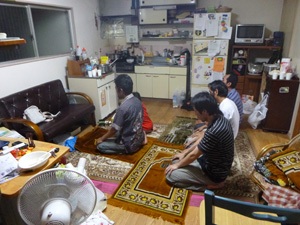Date:2015.6
He is currently absorbed in the study of Islam and immigrants, an interest he has had since high school. He likes the atmosphere of the department, where autonomy is valued.
Shori Ohta (master's program)
Shori Ohta began studying anthropology when he was an undergraduate and is currently studying Muslim immigrants in Japan. He travels to Islamic areas for leisure during longer vacations and applies the anthropological perspectives and knowledge that he has learned. We asked Shori what drew him to Islam and what he finds interesting about it.
Why did you choose anthropology?
When I was either in high school or an undergraduate, I learned that Islam is on this rise in Europe. It got me thinking that Islam might also become an issue for Japan in the future. The number of Muslim immigrants is increasing worldwide. In addition to Muslim international students, the number of Muslims in Japan is also increasing in areas such as the fishing industry, nursing, and factories. I chose anthropology because, aside from the fact that I was already interested in Muslim immigrants, I wanted to become an expert in one area. Anthropology is interesting because it is so broad. In anthropology, we do fieldwork, which involves conducting research while living with subjects, sometimes for many years. I was astonished when I first heard about this research method in one of my courses. In addition, the theories of anthropology are diverse; some are close to philosophy while others are closer to sociology and linguistics.
What are you studying in the master's program?
There is a people called the Hazara, who are from Afghanistan and live in Japan as immigrants or refugees. In the master's program, I am hoping to study their lives and ethnic businesses in the export of used car parts. I researched Muslims living in the Hokuriku region for my final undergraduate thesis. In the course of this research, I learned about a group called the Hazara whose numbers are small and who make a living exporting used parts. When you research the Hazara people, many anthropologically important themes tend to arise, such as issues related to ethnic conflicts in Afghanistan and trade-related globalization.
How is the Department of Anthropology characterized?
I've heard that the Department of Anthropology at Osaka University has an advantage over other university anthropology departments in terms of theory. I think this is because we cover a lot of the literature in our research seminars. It is very helpful that they have us begin by studying the fundamentals. But that doesn't mean they have a lot of rules and regulations that must be followed. They emphasize autonomy. If you want to conduct fieldwork in the master's program, you can. If you want to focus on the literature, you can write your paper in that area. I plan to try my hand at fieldwork.
What makes you glad that you studied anthropology?
Rather than just seeing tourist destinations, I now take an interest in the history and lives of the people when I travel for leisure. Traveling has become more fun because I now see the small things. If I see a mosque, for example, I think, "Oh, there is a Muslim community here. "Since I'm interested in Islam, as you can see, the places I've traveled to are countries like Uzbekistan, Kyrgyzstan, Turkey, and Iran. Although Islam might seem like a homogenous religion, it is actually diverse. It's completely different depending on national policy, region, ethnicity, and so on. They also dress differently, and strictness varies among different regions. I couldn't see the small differences at first, but as I spoke with local people and began paying attention to them, I came to notice the diversity.


